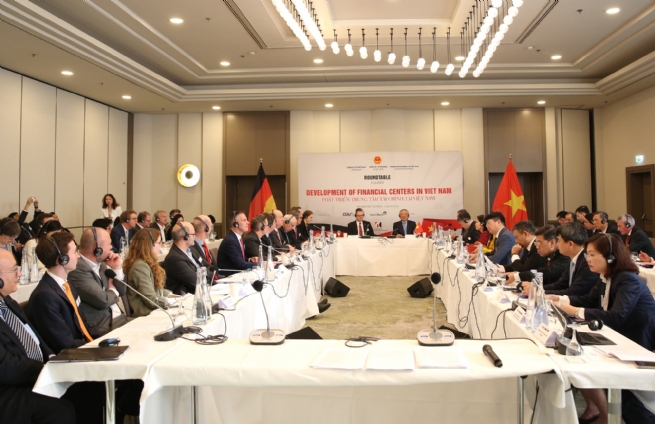Attracting FDI from Germany: Opportunity Amid Global Restructuring
As global investment patterns shift and supply chains undergo major restructuring, foreign direct investment (FDI) from Germany into Vietnam is advancing significantly. Alongside a rise in both the number and scale of projects, German companies are showing a growing interest in Vietnam, which has become a key strategic location in the Indo-Pacific region.
As of mid-2025, Germany has more than 400 valid projects in Vietnam with total registered capital exceeding US$2.88 billion, ranking 17th among countries and territories investing in Vietnam, and 3rd within the EU, after the Netherlands and France.

Roundtable on the development of financial centers in Vietnam
German investors focus on sectors such as processing and manufacturing, renewable energy, logistics, and high technology. Beyond traditional industries, German businesses are now expanding into new potential areas such as green energy and environmentally friendly production, seizing opportunities aligned with Vietnam’s strategic orientation and economic transformation needs.
Among German enterprises investing in Vietnam in recent years, major corporations such as Siemens, Bosch, Thyssenkrupp, and Mercedes-Benz have been leaving a strong mark with their growing presence. These “giants” not only bring advanced technology and global expertise but also play an important role in industrial transformation and production modernization across many sectors in Vietnam.
Notably, in April 2025, Südwolle Group, a leading German textile company, officially began operations at a textile and dyeing plant with a total investment of US$21 million in Ninh Thuan province (now Khanh Hoa province). This milestone reflects Südwolle’s long-term commitment to Vietnam’s textile industry while contributing momentum to Germany’s investment landscape in 2025. In addition, Ziehl-Abegg inaugurated a US$20 million drive and ventilation technology plant in Dong Nai province, while Kärcher, a well-known cleaning equipment brand, opened a new factory in Quang Nam (now Da Nang city) with total capital of US$19.4 million.
In particular, PNE group is completing procedures to implement a Hon Trau offshore wind power project in Gia Lai province with an expected total investment of up to US$4.6 billion. This will be one of the largest energy projects ever invested by a German enterprise in Vietnam, opening a new path of cooperation in the green transition.
According to German investors, Vietnam’s investment environment is increasingly improving thanks to free trade agreements, especially the EVFTA, which provides a clear and transparent legal framework for German businesses. Vietnam is also recognized for its young and abundant workforce, along with strong digitalization momentum, all of which are key factors enabling German enterprises to expand production and pursue technology cooperation opportunities.
The AHK World Business Outlook – Spring 2025 shows that 54% of German companies in Vietnam expect business results to improve over the next 12 months, while 38% plan to increase investment and 43% expect to expand hiring. In addition, 80% of companies rate the current business situation as “good” or “satisfactory.” This demonstrates that Vietnam is not only emerging as a new manufacturing hub but also a sustainable investment destination amid the reshaping of global supply chains.
Nevertheless, German businesses still face challenges when operating in Vietnam. Post-investment administrative procedures remain cumbersome and inconsistent across localities. Infrastructure, though much improved, still has limitations, particularly in transportation and logistics networks. Furthermore, Vietnam’s labor safety and environmental standards are not yet fully aligned with the EU’s stringent benchmarks.
Vietnam is standing before a major opportunity to become the region’s center for technology and manufacturing investment. The combination of digital transformation demand, green growth trends, and Vietnam’s deep integration policies is creating favorable conditions to attract high-quality German capital.
Alexander Ziehe, Chairman of the German Business Association in Vietnam (GBA), emphasized: “Vietnam holds great potential, but to retain and further attract German investors, it is necessary to continue simplifying administrative procedures, perfecting the legal framework, and developing a high-quality workforce…”
Beyond traditional sectors, Vietnam and Germany can strengthen cooperation in vocational training, smart manufacturing, AI technology, environmental protection, and smart logistics. These are Germany’s strengths, while Vietnam is in urgent need of resources to accelerate its transformation in the post-COVID era and global competition.
German FDI inflows into Vietnam in recent times have shown positive and sustainable growth. Despite existing internal challenges, with strong determination to improve the investment environment and by leveraging advantages such as the EVFTA, strategic location, and digital transformation potential, Vietnam is well positioned to become German businesses’ top investment destination in Asia in the future.








